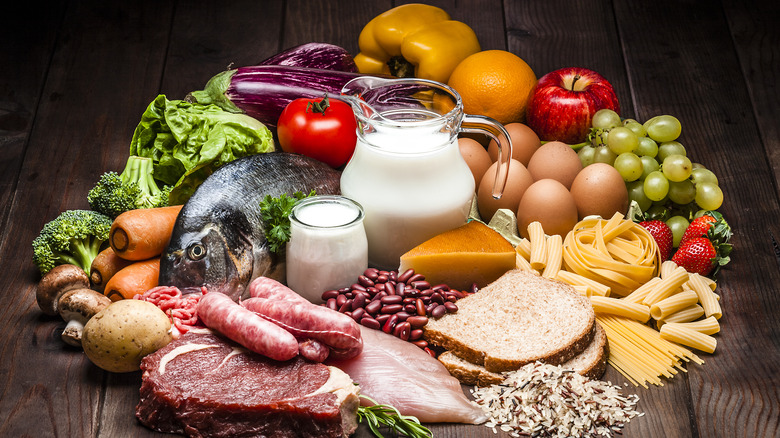The Difference Between Taste Vs Flavor, According To An Expert
The world of food is full of strange terms and concepts that can be unclear to the average person, but two things that seem like they should be simple are taste and flavor. Yet as soon as you start thinking about the difference between them, you realize it isn't that simple. The words get used in place of each other in both articles and conversations with little thought for their distinctions, and taste especially gets reduced to simple concepts like good and bad. What's complicated about these two concepts is that they are related, but they aren't the same. So we reached out to Mandy Naglich, food journalist, advanced cicerone, and author of How to Taste: A Guide to Discovering Flavor and Savoring Life, for help in understanding what makes taste and flavor distinct.
As Naglich explains, "Taste is the five basic tastes (salty, sweet, umami, bitter, sour) that we can sense with our gustatory system." The gustatory system itself is made up of the taste cells, also called taste buds, in your mouth, and its links to the brain. "Everything else we 'taste' in a food or drink is flavor, and that is made up of the combination of taste and aroma," Naglich adds. At its core taste is one of the bases of flavor, but taste and flavor are really two separate sensations in your brain. So how does this complex system work?
What is taste?
As Naglich told Tasting Table, taste is centered around your taste buds, and your sense of it takes place entirely within the mouth. The five tastes like sweet and salty are linked to specific receptors on different parts of your tongue, which signal your brain to let it know you're consuming a specific compound, like acid for sour, and sugars for sweetness. Because of these receptors, taste is something specific and measurable, and it's directly connected to our bodies' need for certain compounds. For example, humans enjoy the taste of salt because we need sodium chloride to regulate our cells and blood.
That doesn't mean that taste isn't complex; contrary to the idea that only certain parts of our tongue sense certain tastes, receptors are grouped together in clusters. Our brains also receive different sensations depending on the mixture of tastes in our food, so not every mixture of salt and sweet tastes the same to us. According to Naglich, tasting can be very active if we pay attention. "People think we're eating, so naturally, we're tasting. They think tasting is something that happens by default. But just as we can hear background music without listening to it, you can eat and drink without really tasting," she says. "Paying attention to taste not only improves the enjoyment you can get out of what you eat and drink, it also changes your brain." That complexity leads directly into how we experience the varied concept of flavor.
What is flavor?
Flavor is a complicated interaction, but its comes from some combination of smell and taste. "Scientists aren't in agreement about a specific number, but aroma is responsible for at least 70% of what we consider flavor," says Naglich. That's why when you can't smell, your food's flavor is so bland or different.
She recommends wine and cheese as good examples of how aroma and taste combine to create flavor. "Without aroma, cheese would just be salty and possibly a little bitter; aroma fills in the rest of the flavor with the creamy dairy and nutty butterscotch notes in an aged cheddar," she shares. This is the reason why sommeliers smell wine too. When you hear a wine has notes of cherry or caramel or pepper, that is usually coming from the aroma, not just the taste.
Naglich says, "Knowing this about flavor makes it important to go out of your way to get a good whiff of anything you're 'tasting.'" And even if you don't actively smell your food, aroma still has a big impact on flavor. Taste happens within the mouth, but when you drink or eat, aroma compounds travel through the back of your mouth into your nasal cavity, where they activate receptors, so your nose is still informing the brain about the flavors it's sensing. Tastes are important sensations, but the flavors that result from their interactions with smells are what make food truly enjoyable and memorable.


